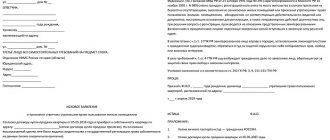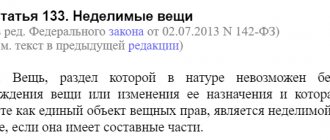The director of the legal service “Unified Center for Protection” (edin.center) Konstantin Bobrov answers:
If a young son has other housing, then it is possible to go to court with a claim to recognize the father and son as having lost the right to use the residential premises. However, if the child has no other housing, the guardianship authorities will not allow his legal eviction. Since the Family Code gives children the right to live with their parents, the legal eviction of a father and young son will be extremely difficult.
What is social housing and who is it for?
How can I prevent my grandson and daughter from applying for an apartment?
Constant absence from the apartment.
The first and main condition under which the defendant can be recognized as having lost the right to use the apartment and on this basis be discharged from it is a permanent absence from the apartment.
Absence (non-residence) in an apartment can be permanent or temporary.
In other words, the defendant may be absent from the premises temporarily or absent permanently.
If the defendant has left the apartment for a while, that is, his absence from the apartment is temporary, then it will not be possible to recognize such a defendant as having lost the right to use the residential premises on legal grounds.
If the defendant is temporarily absent from the apartment, it is inappropriate to go to court with a claim to recognize him as having lost the right to use the residential premises, since there are no grounds for winning in court.
If the defendant is constantly absent from the apartment, then you have legal grounds to expect victory in court.
The reasons for the defendant’s constant absence from the apartment may be:
- leaving the apartment for another place of residence,
- initial failure to move into the apartment (that is, the defendant never moved into the apartment or lived in it).
How to distinguish a temporary move out of an apartment from a permanent move out?
The following reasons for leaving the apartment may indicate a temporary absence from the apartment.
For example:
- traveling to work in another area (long business trip, rotational work, etc.);
- training (full-time at a foreign university, studying abroad, etc.);
- treatment (hospitalization in a hospital, medical examination, etc.).
The above reasons are not the only ones. There may be other reasons and life circumstances under which the defendant may be temporarily absent from the residential premises.
If the reasons for the defendant’s departure from the apartment are the above circumstances or other facts similar to them, then the absence from the residential premises is temporary.
It will not be possible to recognize such a defendant as having lost the right to use residential premises on legal grounds.
The following circumstances may indicate the permanent absence of the defendant from the apartment:
- the defendant removed his belongings;
- moved to another locality;
- got married and lives with a new family in another residential area;
- the defendant never moved into the apartment and the failure to move in was not related to work, study or treatment.
The listed circumstances indicating a permanent absence from the apartment are not the only possible ones; there may be others.
Other circumstances, which can be very diverse, may also indicate the permanent nature of absence from the apartment.
It is important that the reasons for such absence are not: work, training, treatment, or circumstances indicating that the defendant’s absence from the apartment is temporary.
Thus , if the defendant is absent from the residential premises and this absence is not related to work, study, treatment or other similar circumstances, but he has taken out his things and/or moved to another locality and/or got married, or never moved into the apartment, then such absence can be considered permanent.
And as a result, you have a chance of success in a court case to recognize this citizen as having lost the right to use the apartment.
However, not all so simple.
There are a number of additional circumstances that the court must examine, and on which the outcome of the court case also depends.
The head of the legal support department, Ksenia Buslaeva, answers:
The issue of deprivation of the right of registration and residence by tenants of municipal apartments can be raised after six continuous months of non-payment of utility bills. This is stated in Article 90 of the RF Housing Code. However, the decision on forced deregistration is made only in court, and the court will definitely consider the reasons for non-payment. He will classify as valid: systematic delay in payment of wages (pension, other means of subsistence, etc.), disability, guardianship of a dependent or minor; It is quite possible - ignorance of the existence of debt and other reasons. Only the owner of the premises, that is, the municipality, can act as a plaintiff in the case.
How to buy a room from the municipality?
Can I be deprived of the right to live in a service apartment?
Is it possible to discharge a person from a municipal apartment?
The legislator provides for mandatory registration of every citizen. If a person does not want to undergo this procedure, then administrative liability may arise. We talked about this in detail in this article.
But in order to register at a new address, you must first check out of your old home. Is it possible to do this if your registration is in a municipal apartment? There are two methods of discharge, let's consider them in detail.
Voluntarily
The voluntary procedure for deregistration involves contacting the Department of Internal Affairs of the Ministry of Internal Affairs of the Russian Federation at the location of the apartment from which you want to deregister.
In this case, the consent of neither the owner of the property (the municipality) nor other tenants is required.
Without agreement
If there is a need to discharge a person from a municipal apartment, but he does not agree with this, then you will have to act differently. The only government body can decide that a citizen has lost the right to use the apartment and is subject to deregistration, the court.
Therefore, before making changes to the apartment card (house register), you will have to contact the justice authorities. Without a court decision, no passport officer will discharge a person who does not agree with the eviction.
CENTURY 21 Russia lawyer Damir Khakimov answers:
Residents can be forcibly expelled from a municipal apartment if they have moved to another place of residence, that is, they are constantly absent from their place of registration (Part 3 of Article 83 of the Housing Code of the Russian Federation). At the same time, in court you will still need to prove that these residents left the place of registration voluntarily, and not forced, and also that their absence is not temporary (due to study, treatment, service, etc.). The court will also take into account the fact of failure to pay for housing and utilities.
Failure to pay may itself also be grounds for eviction, but in this case the landlord (municipality) is obliged to provide alternative housing.
Conditions for discharge are the same for everyone
It doesn’t matter who you want to write out: your ex-spouse, a close or distant relative, a stranger, etc. Kinship doesn't matter. Only for the convenience of readers, I wrote separate articles about the discharge from the municipal apartment of my ex-husband, ex-wife and my adult (adult) children (adult son/daughter/grandson).
Only a person can be discharged from a municipal apartment who, through his actions, shows that he himself has renounced his right of residence/use. Therefore, in a lawsuit and in court, you need to ask to recognize this person as having lost this right. In 2009, the Supreme Court ruled under what circumstances this can be done. They are listed in paragraph 32 of the Resolution No. 14 of July 2, 2009. ALL THE FOLLOWING CONDITIONS MUST BE FULFILLED and are considered by the judge in their entirety:
- A person must not live in an apartment for a long time - clause 3 of Art. 83 Housing Code of the Russian Federation. The longer he doesn't live, the better. The minimum period is not established by law and you will not find it in any official documents. Personally, I think the minimum is 3 years .
More precisely: if he does not live for a year, then the chance of being discharged is a maximum of 20%. If two years - 50%. Three years or more - 95%. All these % are my opinion based on 10 years of experience. Why not 100%? Firstly, there are other conditions, which are listed below. Secondly, you can’t predict everything accurately.↓ - He left the apartment on a permanent basis, and not temporarily due to study, work, business trips, treatment, etc. - Art.
71 Housing Code of the Russian Federation. That is, I took all my things out of the apartment. It’s even better if he lives in another locality. The longer a person does not live in an apartment, the more it is implied that he has moved out on a permanent basis. That’s why the minimum period of non-residence, which I indicated above, is important.↓ - Left voluntarily, and not forced - clause 2 of Art. 1 Residential Complex of the Russian Federation. For example, because of conflicts or he is in prison. The court will definitely not release a person who is in prison. After all, he left forcedly. Of course, you can submit a court verdict to the passport office and it will be issued, but only “formally”. After leaving prison, he can register back without any problems. And if the apartment becomes privatized, then through the court it is easy to challenge the privatization and get a share of the apartment. Even when the owner changes.↓
- From the moment of departure, he does not pay utility bills, does not participate in the repair and maintenance of the apartment - clause 4 of Art. 69 Housing Code of the Russian Federation. The minimum period for non-payment of utilities is also 3 years, as is the period for non-residence. If a person pays for at least some part of the utilities and proves this in court, he will not be discharged.↓
- He did not try to move into the apartment again, and if he did, he was NOT prevented from doing so.
The extract instructions themselves are written below.
You have a better chance of success with a lawyer and here's why
Even if all of the above conditions are met, this is only half the battle. The difficulty is that everything needs to be PROVED IN WRITING. The judge does not believe the words and arguments. And in order to prove everything, you need to provide the judge with certain certificates/acts from various government departments and organizations.
An ordinary citizen will not be able to obtain some documents because he does not have a certain status and authority. He will be able to submit requests, but they will not answer them, because they are not obliged to. Therefore, you need to contact a lawyer. He, having legal status, will make inquiries about the necessary organizations - paragraphs. 1 clause 3 art. 6 and paragraph 5 of Art. 6.1 Federal Law of May 31, 2002 No. 63-FZ. Organizations are required to respond to requests from lawyers, otherwise they face a fine - Art. 5.39 Code of Administrative Offenses of the Russian Federation.
If you do not contact an attorney, you can ask the judge to make requests. He won't offer it himself. The judge will formalize the requests and invite you to take them to the organizations. Plus, pick up the answers when they are ready, wasting your time and money. He will offer it, but he has no right to force it. THE WORST thing is that 1) you will not have the opportunity to adjust requests that are more beneficial to you. 2) You will also not be able to filter the responses received by discarding unnecessary ones. In addition, you won’t even recognize some of the answers - they will be sealed in envelopes. All this greatly reduces your chances of winning your case.
It's different with a lawyer. He will study your situation in detail, then before the trial he will send requests to those organizations and departments that are beneficial to you. The hired lawyer himself will draw up a request, send it and collect answers to them. And from the received answers he will select the most useful ones.
Our law office "Bessonov and Partners" offers residents of Moscow or the region. We will take on all the possible work - we will draw up a correct statement of claim, collect all the necessary documents and submit them to the court. You will not need to come to court hearings; the office's lawyer will participate in them and will do everything possible to win the case. At the end of the trial, we will bring you a copy of the court decision.
We have been working in the field of court records since 2008 and have won 84% of court cases.
The cost of the service is 90 thousand rubles. For visitors to this site there is a discount of 5% to 10%. To receive it, say that you came from the website “Prozhim.com”. For all questions and for a free consultation, call 8 (495) 642-31-96 (daily from 9:00 to 21:00 Moscow time / only for residents of Moscow and the region).
About your residential address
I will answer popular questions in advance - “If a person has moved out of a municipal apartment, but it is unknown where he lives now, what address of his residence should he indicate in the statement of claim? And if known, then indicate the actual address? Where will the subpoenas be sent to him?
The Supreme Court believes that the defendant’s residential address is his registration address - paragraph 63 of the Resolution of June 23, 2015 N25. Therefore, in the statement of claim and other documents, we indicate the person’s place of residence and the address of the municipal apartment from which he needs to be discharged. He is registered in it. The plaintiff has no obligation to know the actual residential address of the defendant.
As a result, all court summonses will be sent to the person at the address of the municipal apartment - Art. 113 Code of Civil Procedure of the Russian Federation. If he does not receive them (since he does not live there), the court will still consider him notified. The law will be respected. A citizen is obliged to receive correspondence that is important to him. If he does not appear in court, the claim will be considered without his participation - clause 4 of Art. 167 Code of Civil Procedure of the Russian Federation. This plays into the hands of the plaintiff, because the defendant will not be able to defend his interests in court.
Lawyer, Chairman of the St. Petersburg Bar Association Globus Pravo Denis Volnov answers:
Theoretically, you can go to court to recognize citizens as having terminated the right to use residential premises and subsequently deregister them. In practice, with the proper approach of your opponents, it is very difficult to win such a case. The problem is that defendants in such cases take the position that they do not live in the apartment due to conflicts with the plaintiff. There are clarifications from the Supreme Court of the Russian Federation on such grounds, and the courts reject the claim.
Your situation is further complicated by the fact that one of those registered is a minor. At the same time, you have the right to recover part of the utility bills, but for a maximum of the past three years (statute of limitations).
What kind of government support can you get if you don’t own a home?
Can I be denied registration in the apartment where my family lives?
Acquiring the right to use another residential premises
The fourth condition is the acquisition by the defendant of the right to use another residential premises in a new place of residence.
The court will also be responsible for clarifying the question of whether the defendant has acquired the right to use another residential premises.
In this case, it does not matter on what right the defendant acquired the right to use another residential premises: on the right of ownership, under a lease agreement, a sublease agreement or on another right.
If the defendant has acquired the right to use other premises, then this circumstance will be taken into account in favor of making a decision to recognize him as having lost the right to use the disputed apartment.
However, if the defendant, who voluntarily left the disputed apartment for another place of residence, does not have the right to use another residential premises, in other words, he does not have his own other housing (for example, he rents an apartment), then this circumstance in itself cannot be a basis for refusal in recognizing the defendant as having lost the right to use the disputed residential premises.
In other words, if the defendant who is registered in your apartment does not own another apartment, house or share in common property, this does not mean that he cannot be discharged.
Thus, if the defendant has moved out of your apartment, but he has no other housing, this does not mean that he will win the case.
The defendant’s lack of other housing does not guarantee him the right to be registered in your apartment.









